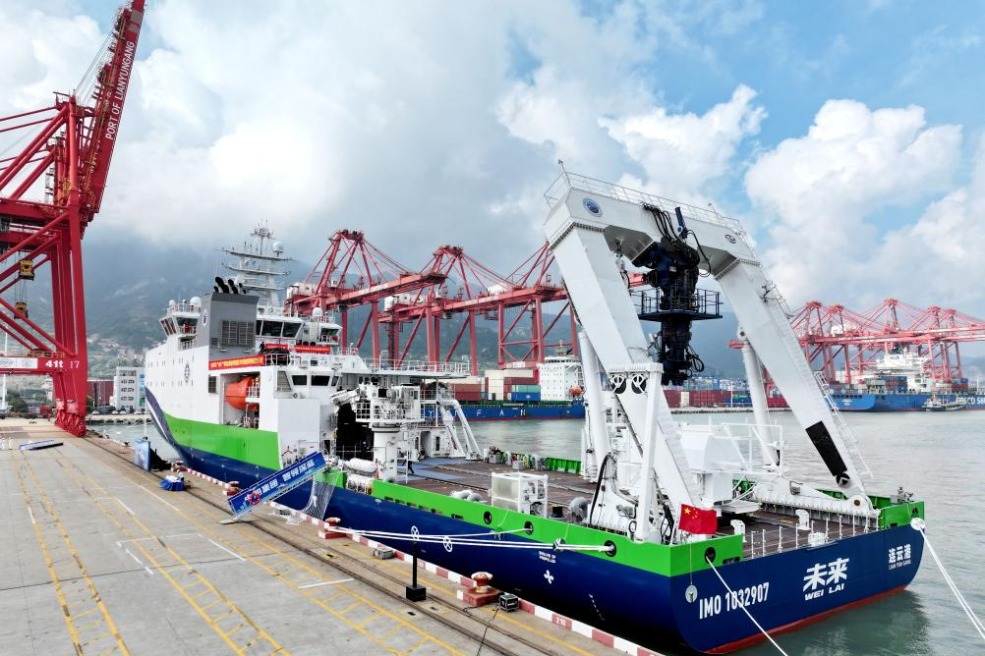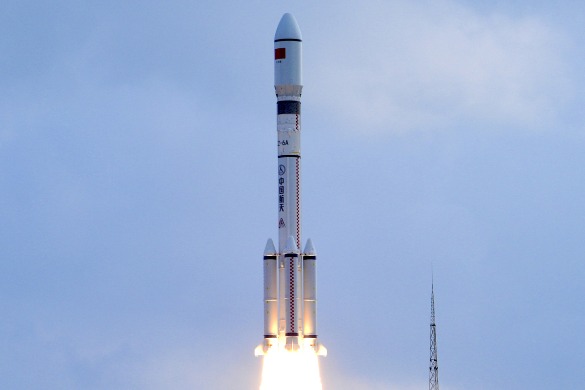Heavy-ion accelerator integrating into cancer treatment in China

BEIJING -- An upgraded new-generation medical heavy-ion accelerator for cancer treatment is now under construction in a hospital in South China's Huizhou city, shedding light on a homegrown high-end medical facility for more cancer patients.
This facility, the second-generation heavy-ion medical machine (SIMM), is expected to enter its installation and commissioning phase this year, according to the Institute of Modern Physics (IMP) under the Chinese Academy of Sciences.
The IMP said that, compared to previous versions, the new SIMM is being developed as a demonstration project for inclusive medical care at the Huizhou Central People's Hospital in South China's Guangdong province.
This SIMM is also a testament to the unrelenting efforts of Chinese scientists in upgrading such a large, high-end facility to make it more adaptable to medical use, according to the institute.
It features diverse improvements, including enhanced cancer treatment efficiency, a smaller volume, and lower hospital operating costs and power consumption, according to the IMP.
NEW LIGHT FOR CANCER TREATMENT
"Due to the unique physical and biological advantages of heavy-ion beams, they are known for their 'killing power' on cancer cells and regarded as the future direction of cancer treatment," according to the IMP deputy director, Yang Jiancheng.
Heavy-ion radiotherapy is recognized internationally as one of the advanced radiotherapy methods. It's suitable for the treatment of some solid tumors that are unsuitable for surgery, insensitive to conventional radiation, and prone to recurrence after conventional radiation therapy.
High-speed, heavy-ion beams produced by the accelerator are channeled into the treatment room to target and kill the tumor cells of cancer patients.
They can first precisely locate the lesion site and its affected range, and then concentrate and release energy at the target location, leading to a higher probability of DNA double-strand breakage in tumor cells and making them undergo apoptosis.
Compared with conventional radiotherapies, heavy-ion beams feature less damage to healthy tissues surrounding the lesion, a shorter treatment course, and less pain, as well as a limited impact on patients' daily activities, according to Yang.
"The under-construction SIMM in Huizhou will have a higher heavy-ion beam intensity and a higher operational efficiency, which will benefit both the patients and the hospital," Yang said.
"Miniaturization is one of its key highlights," Yang said. He disclosed that scientists carried out a structural upgrade by converting the SIMM into a longitudinal vertical structure, which differs from the horizontal flat structure of the medical heavy-ion accelerator currently used in a hospital in Wuwei, Northwest China's Gansu province.
The SIMM in Huizhou has a shortened circumference compared with the in-use facility in Wuwei, which has a circumference of 56 meters.
It will also reduce the impact on the power grid and operational power consumption, achieving a more eco-friendly operation and lower operating costs for the hospital, according to Yang.
"The evolution into smaller volume, lower power consumption, and smaller floor space enables such a facility to be applied in other hospitals in the future," Yang said.
HIGH-END TECH BENEFITS PUBLIC HEALTH
The health and safety of the people is one of the key focuses for China to speed up its efforts in strengthening science and technology.
The continuous progress of medical heavy-ion accelerators reflects the country's efforts to optimize the utilization of its scientific and technological achievements, thereby enhancing people's well-being and sense of happiness, as well as other key sectors.
The IMP has been dedicated to developing heavy-ion accelerators and transforming them into high-end medical use via a series of breakthroughs in key core technologies achieved independently.
In March 2020, the country's first homegrown medical heavy-ion accelerator, developed by the IMP, was put into operation in Wuwei Tumour Hospital in Gansu province.
As of June 20 this year, more than 2,020 patients, including five from foreign countries, have received heavy-ion accelerator treatment here for over 40 types of tumor diseases, according to Nie Peng, vice-president of the hospital.
Nie said that these patients were tortured by tumors in the central nervous system of the head and neck, chest, abdomen, pelvis, spine, limbs and others.
To carry out cancer treatment, the medical physicists in the hospital will first analyze the patient's tumor location and construct a real-time spatial structure of the organs for drafting the therapeutic solution.
In the neighboring treatment room, the patient's treatment unit is connected to the medical heavy-ion accelerator, with fixed models ensuring that the heavy-ion beams are delivered to the patient precisely.
The hospital followed up with all the patients who had completed treatment. In clinical trials, their 12-month and 36-month survival rates reached 88.11 percent and 70.09 percent, respectively.
Following the facility in Wuwei, similar medical heavy-ion accelerators have been put into use in Lanzhou, Hangzhou and Putian. The facilities are also under construction in Nanjing, Changchun, and other cities.
More explorations and efforts are underway to advance the progress of the medical heavy-ion accelerators and other high-end medical equipment for precision radiotherapy and other clinical applications, according to the IMP.
- Heavy-ion accelerator integrating into cancer treatment in China
- Duty-free complex welcomes cats and dogs in Hainan
- Tech solutions for cutting food waste urged
- People using AI tech to aid cybercrime will face severe penalties
- East China province prepares for typhoon Co-May's comeback
- China reports 'No1 flood' of 2025 in major rivers amid heavy rain





































